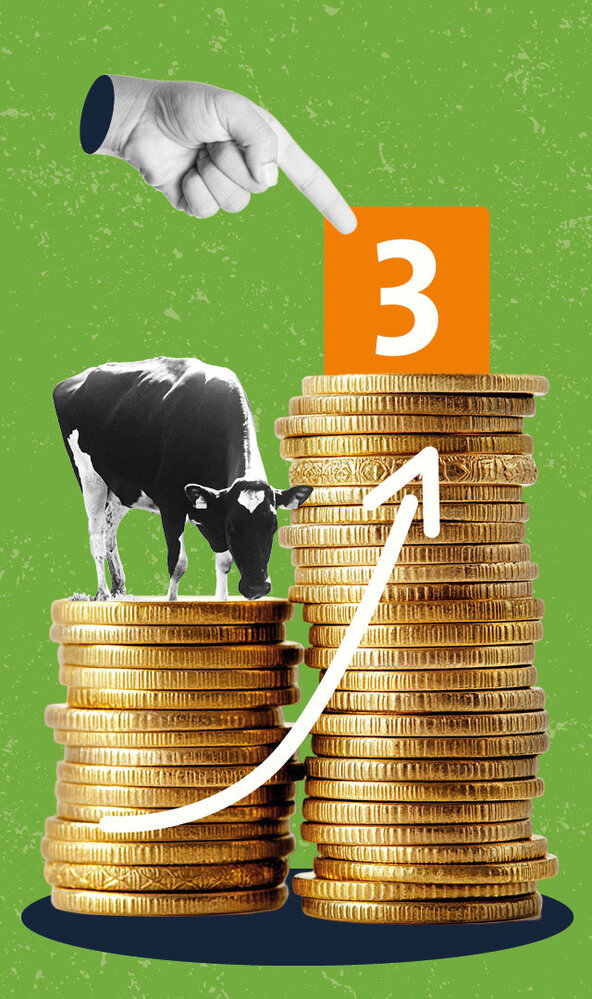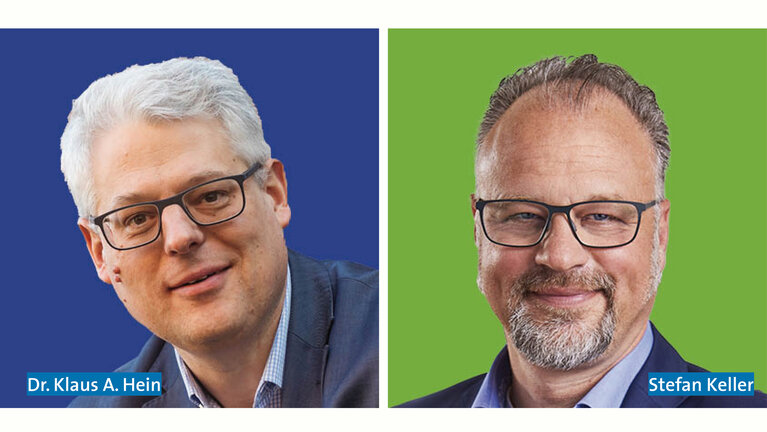
After DMK announced last summer that it would convert large parts of its product range to Farming Type 3, a lot has happened behind the scenes. Farmers had to be informed about the conditions for participation, audits of interested farms had to be initiated and organisational adjustments had to be made in the plants and in milk collection. At the same time, discussions were initiated with retailers to market the farmers' commitment, which DMK is rewarding with a surcharge of three cents per kilogram of raw milk, including the VLOG surcharge. We spoke to Stefan Keller, COO Business Unit Private Label, and Dr Klaus A. Hein, Chief Agri Business and Member Affairs, about whether Type 3 milk and dairy products will be a sales driver for DMK in the future, and how farmers feel about the issue.

Where do we stand today with regard to Farming Type 3?
Dr. Klaus A. Hein
“Legal requirements and social awareness of animal welfare in food production have become increasingly important to consumers in recent years. This led to DMK's decision to convert a large part of its product range to Farming Type 3. Although this creates challenges along the value chain, we believe that the opportunities for our members outweigh the challenges. It will increase the value added on our member farms and enhance the value of their work. However, this additional effort must also be worthwhile for our members.”
Stefan Keller
“Specifically, we started the first transition to Farming Type 3 last year in Erfurt with the UHT milk product, which can already be found in food retail under the Farming Type 3 (HF3) label. Other factories and products will follow this year. The focus will be on the cheese, quark (including granulated cream cheese) and UHT milk product groups. Other ranges, such as cream and UHT cream, are still being evaluated to decide whether to introduce Farming Type 3.”
Will Farming Type 3 become the next standard in food retailing?
Stefan Keller
“Overall, the trend towards HF3 is here to stay, partly because the major discounters have decided to offer only Farming Type 3 and 4 products in a few years’ time. However, I believe that HF3 will be a definite standard as early as next year. This fits in well with the DMK Group, which is a real retailer and food service provider in Germany and has good brands. The move to Farming Type 3 is in line with our vision - we want to be the first choice for consumers and customers.”
What is the retailer's attitude to Farming Type 3?
Stefan Keller
“Various retail partners have asked for Farming Type 3, so the switch is a logical step for us to position ourselves for the future in this relevant area. Especially in the private label segment, there has been a noticeable increase in the amount of Farming Type 3 dairy products recently. And last but not least, a label has been established in the retail sector that food manufacturers and retailers can agree on.”
What does this mean for contract negotiations with food retailers?
Stefan Keller
“It means that we are investing with our farmers in the introduction of Farming Type 3 to accommodate retailers and ultimately consumers. HF3 is a good argument to explain the milk price paid to customers. Sometimes there is still a need for discussion because it is argued that the cows on our farmers’ farms are already kept to the highest standards and produce high quality milk. From our customers’ point of view, the leap to Farming Type 3 is not a big one. But it is about meeting standards, which is why the HF label was introduced. And that has its price, because at the end of the day it is always about product quality.”
How is Farming Type 3 being received by farmers?
Dr. Klaus A. Hein
“We don't think we need to carry out a lot of work on educating them. Farmers have invested more in animal welfare in recent years and have future-proofed their barns and farms. The interest in participating in the programme is correspondingly high. The farmers in our cooperative are independent entrepreneurs and therefore have a good eye for the market situation and developments in milk production and consumer demand. They have long recognised that the trend towards greater animal welfare is not a passing fad, but has a lasting impact on milk production.”
What support and incentives has the DMK Group provided for the transition to Farming Type 3, and why is there no direct transition to Farming Type 4?
Dr. Klaus A. Hein
“We want to give all our farmers who have already invested in better animal welfare, or are doing so as a result of the transition, the opportunity to participate in the programme and be rewarded for their commitment. This is reflected in the premium farmers receive for meeting the standard, which provides a good basis for further developing their farms in terms of animal welfare. We also want to send a clear signal to the market about animal welfare and enable our wide range of products to be classified as Farming Type 3. Farming Type 4 is reserved exclusively for pasture standards and therefore serves a niche programme.”
What are the options for farmers who are not currently participating in the programme?
Dr. Klaus A. Hein
“Farmers who are interested in participating have the opportunity to join the QM++ programme every six months. Specifically, the programme opens on 1 April and 1 October each year. Our Agricultural Field Service provides support during the transition. We also offer webinars, for example, to provide all the information quickly and in an accessible format.”


